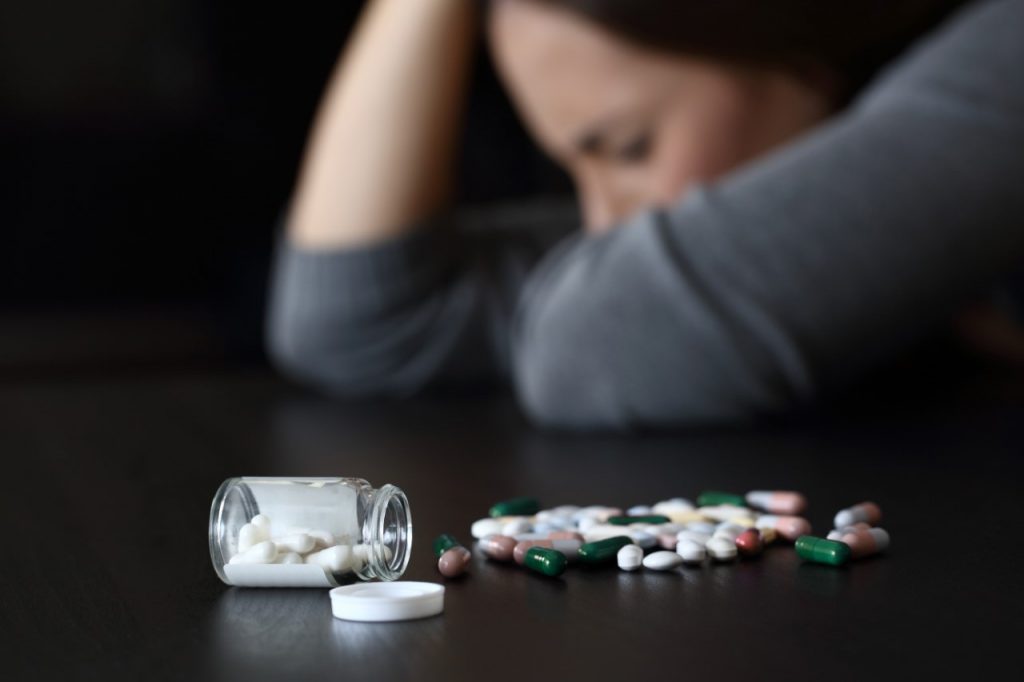
Substance misuse affects millions of people around the world every year and can be extremely harmful to our health. Misusing substances can quickly lead to dependency and addiction, where cognitive, behavioural and physiological problems develop.
Being on substances to get you through the day can make you feel lost and powerless. Like your life is on a never-ending loop run by your need to fuel your habit.
In 2015 alone, more than 15,000 people died from overdoses of prescription opioids. So misuse of substances – illegal or otherwise – is no small issue. But with the right treatment and support, you can kick the habit and break free from your addiction.
The effects of substance misuse reach far beyond the individual with the addiction, too. For friends and family members, watching someone you love battle with substance misuse can be extremely difficult, leaving you feeling helpless and constantly worried about their wellbeing.
When untreated, substance misuse problems can have detrimental effects on a person’s health, relationships and more. In this article, we’ll take a closer look at what substance misuse is and some of the effects it has on the individual and people around them.
So what is substance misuse?
Substance misuse is defined as regular use of alcohol or drugs which may be causing issues in someone’s life; affecting their job, personal life, and in many cases – their safety.
Alcohol dependence is the most common form of substance misuse, but any drug, including heroin, cocaine, crack and cannabis, falls into this category. As does the misuse of glue and aerosols.
What is substance dependency?
Misuse of substances can quickly turn into a dependency and form harmful addiction. Symptoms of substance dependency include; developing a tolerance for a specific drug, going through withdrawal symptoms without it, and struggling to cut back on it regardless of its harmful effects.
Effects of substance misuse on mental health
Substance misuse is often very closely linked to mental health and many people who struggle with substance misuse also struggle with a mental health challenge.
Research shows that one in four adults in the U.S. with serious mental health issues also have problems with substance misuse. And people who struggle with addiction are twice as likely to have a mood or anxiety disorder.
Similarly, people who are struggling with a mental health issue can turn to drugs and alcohol as a way of coping – behaviours that can make their existing mental health challenges worse.
In some cases, drug use is what actually causes a person’s mental health issues. For example, using cocaine can lead to anxiety, misusing marijuana is often linked to increased depression, and misusing prescription medications can lead to anger, paranoia, and even psychosis.
The effects of substance misuse
Substance misuse can have all kinds of negative impacts on a person’s life. From their mental and physical health to their relationships and personal life.
In its most serious form, a substance use disorder can have serious, potentially life-threatening consequences. If someone is misusing substances, you may notice a change in their behaviour at work, school, in their relationships, or around money.
Some mental symptoms of substance misuse include:
- Poor decision-making abilities
- Inability to concentrate or focus
- Confusion and disorientation
- Memory loss
- Powerful cravings for your substance of choice
Effects of substance misuse on physical health
Substance misuse can also have a negative impact on a person’s physical health.
The physical effects vary depending on the substance of choice, for example; long-term alcohol misuse can cause liver failure and blood clots, and on the outside, the individual’s skin may appear yellow. But that’s not the case for all substances.
Here are some physical signs of substance misuse to look out for:
- Sleep disturbances
- Unintended weight gain or loss
- Chronic fatigue
- Sinus issues or watery eyes
- Digestive concerns
- Skin rashes or breakouts
- Dental decay
- Heart and/or circulation problems
- Organ damage or failure

Effects of substance misuse on someone’s personal life
When someone develops a dependency or an addiction to a substance, it often has impacts far beyond the individual. Substance misuse can impact family relationships, friends, intimate relationships, work, and just about every other area of a person’s life.
It’s common to see a rapid change in behaviour and personality. They may distance themselves from their usual circles, appear unfocused at work or prefer to spend time alone.
When you have formed a dependency on a substance – everything else in your life tends to take a back seat.
On parents
Many parents of addicted children feel in some way responsible or guilty for their loved one’s addiction. They might wonder where they went wrong or what caused them to go down this path.
Parents of substance-dependent individuals frequently worry about the safety and wellbeing of their child, which in some cases can lead them down a similar path.
On siblings
Siblings of addicts are sometimes referred to as the ‘invisible victims’. Parents are often so consumed by the sibling with the addiction problem that they get most of the attention, love and care. Leaving the non-addict sibling feeling confused, frustrated and sometimes resenting their family.
Having a sibling with an addiction can often work as a deterrent for the other siblings, while for others it can lead them down a similar path. They may develop their own bad habits either as a way to escape the pain or to draw some of their parents’ attention back to them.
On children
Substance misuse has a huge impact on young minds growing up in the household too.
An estimated one in eight children lives with a parent who had an active substance use disorder in the past year. Children living with a single parent who abuses drugs don’t have anyone else to turn to, similar to children living in a two-parent household with both parents struggling.
Children who live with an addicted parent grow up in an unpredictable environment. They receive inconsistent physical and emotional support and there is a much higher possibility of abuse or violence. Children in these environments experience affected social development, self-confidence, health, and more.
On finances
It isn’t cheap to support an active drug habit and many addicts dedicate all their money toward getting the substances they need. Prioritising their habit over food, healthcare and more. They often have a hard time keeping a job too, so they tend to reach out to friends and family for money, food, shelter, or other forms of support.
What to do if you or someone you know is misusing substances
Substance misuse – like any other addiction – needs proper treatment and care.
At our purpose-built rehabilitation facility here in the heart of Cheshire, we have a range of flexible programmes to help you or someone you know recover from substance misuse.
Taking a more holistic, individual-led approach, we’ll provide you with all the tools needed to not only live without your addiction holding you back, but grow beyond it.
Breaking free from your addiction is possible. Whether it’s you or someone you know that needs help – we’ll be here with all the support needed whenever the time is right.
To discuss a stay with us, call the team today and see how we can help you or your loved one grow beyond addiction.






